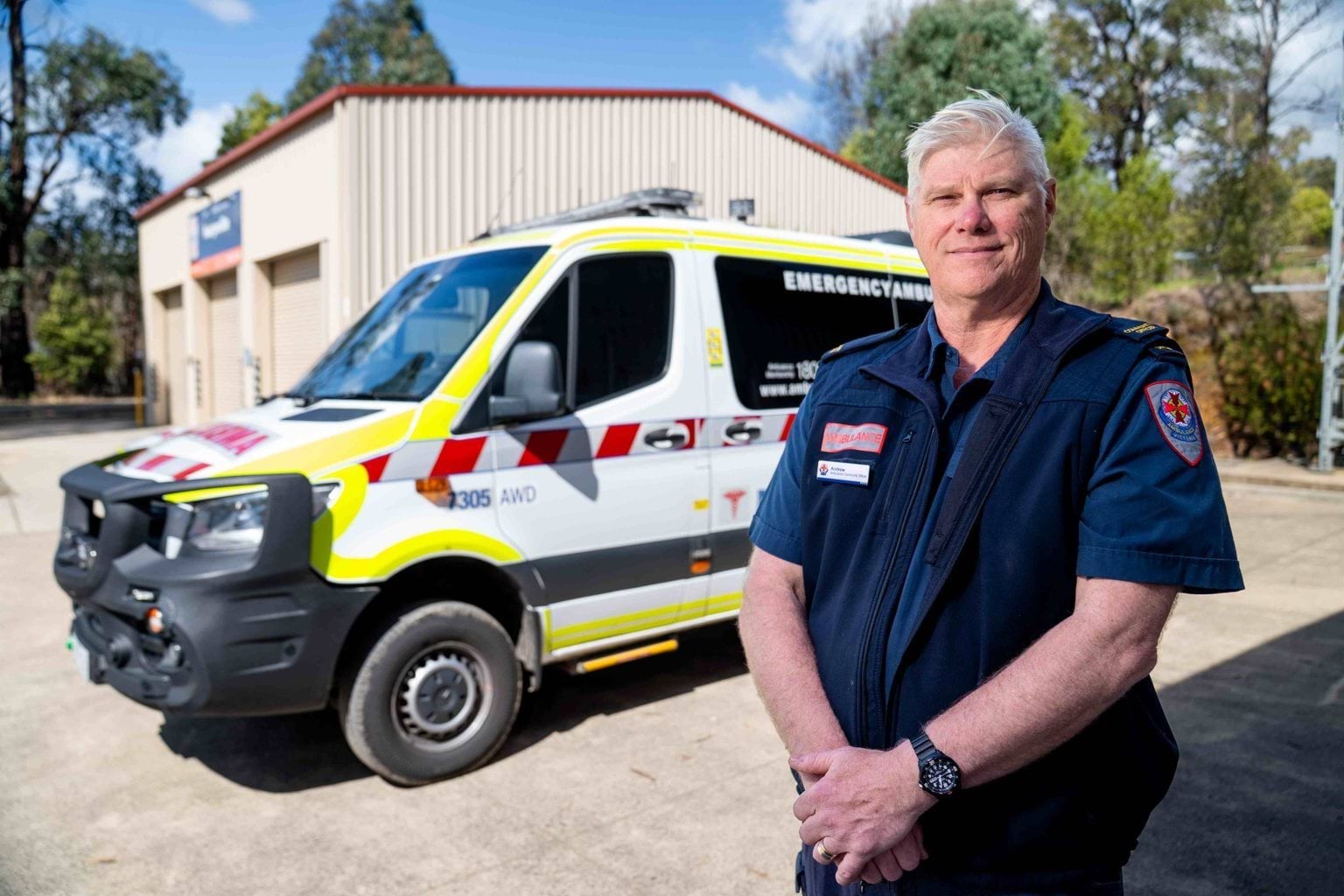- Published:
- Thursday 16 October 2025 at 1:09 pm

16 years ago, Andrew Driscoll almost lost his life after experiencing a cardiac arrest at home. Today, he proudly wears an Ambulance Victoria (AV) uniform, driven by his passion to teach others what to do in an emergency.
At only 43 years old, Andrew was asleep next to his wife, Karen, when she noticed he wasn’t breathing. After trying to wake him, Karen implemented her first aid knowledge and started cardiopulmonary resuscitation (CPR) while calling Triple Zero (000).
“Having practiced CPR when I was at school, I knew what to do,” she said.
“I was so relieved when I heard the firefighters and the paramedics arrive. Instantly the house was full of people there to help Andrew, it was reassuring handing the reigns over to them.”
With the family about to move house, paramedics walked into a chaotic scene, having to move aside boxes to create enough space to work on Andrew.
After an hour of CPR, interspersed with several rounds of shocks from the defibrillator, the chances of Andrew waking up were becoming slim, yet he defied all the odds and crews finally achieved return of spontaneous circulation (ROSC).
Once paramedics had stabilised Andrew, he was transported by road to Box Hill Hospital where he spent more than a week in a coma. Throughout his recovery, he kept thinking about how he owed his life to the quick actions of his wife.
“I slowly started coming to terms with what had happened to me and realised that I wouldn’t be here without the CPR,” Andrew said.
Every day, around 21 Victorians experience a cardiac arrest and only one in 10 survive. For every minute that CPR is delayed, survival decreases by 10 per cent. When a patient receives CPR and a shock from an AED before paramedics arrive, their chance of survival more than doubles
This ignited a fire in Andrew and he became determined to ensure as many people as possible learn CPR and where their nearest public automated external defibrillator (AED) is located.
It was this journey that led Andrew to take the next step and become an Ambulance Community Officer (ACO) in Marysville.
“The decision came from wanting to give back a little bit,” he said. “Being an ACO is a great thing to do in the community; you play a vital role in getting people the help they need, when they need it most.”
“For me, it feels like a full circle moment. People showed up and saved my life, and now I’m showing up and helping others.”
ACOs are AV first responders employed on a casual basis, working on-call in rural and remote communities. They are trained to provide advanced first aid and can transport patients to hospital.
ACOs are often the first on scene, meaning Andrew and his fellow first responders play a critical role in delivering healthcare to their local area.
Now four years into being an ACO, Andrew said he’s never looked back, with the role providing him a greater platform to spread Call, Push, Shock messaging, AV’s community education initiative teaching the public how to perform CPR.
Whether it’s at an AV community information session, or simply through speaking to locals down the street, Andrew takes every opportunity to share the three actions that saved his life all those years ago.
“The idea of having that information in the wider community is important to me, I want everyone to know that they have the ability to save a life by following three simple steps – Call, Push, Shock,” he said.
“If you see someone unresponsive and in cardiac arrest, call Triple Zero (000), start compressions and push hard and fast in the middle of the chest, and if one is available, use a nearby AED to provide a shock before paramedics arrive.”
Every day, around 21 Victorians experience a cardiac arrest and only one in 10 survive.
Having responded to at least eight cardiac arrest cases as an ACO, not all with positive outcomes, Andrew said it makes it “feel like a miracle” that he’s still here with the people he loves.
“It makes you want to experience more and treasure the moments you’ve got,” he said.
“At every special occasion there’s a moment where we think about the fact Andrew easily could have not been here,” Karen said.
“We’ve been to children’s weddings, we’ve welcomed a grandchild, and Andrew has been there for every one of those moments because he received early bystander CPR all those years ago.”
This Shocktober, AV is calling on all Victorians to learn CPR and know where your nearest publicly accessible AED is, so you can help save a life if someone nearby experiences cardiac arrest.
AV is also encouraging people to sign up to the GoodSAM app, which connects patients in cardiac arrest with a nearby volunteer who is willing to start hands-only CPR in the crucial moments before paramedics arrive.
Resources on CPR available in multiple languages.
Updated

